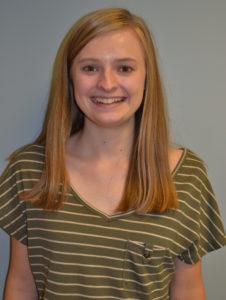
October is National Disability Employment Awareness Month and was created to celebrate a diverse workforce when people with all abilities are included. Through individual planning, support coordinators at Boone County Family Resources assist people in identifying and taking part in school- or work-related experiences before high school graduation to help them define what life will look like as an adult. Every person’s journey is different, but having a plan for what life will look like after school is over is an important part of transitioning to adulthood. Abby and Derrick followed two different paths, but both now have jobs in the community that they enjoy.
When Abby was in high school, she wasn’t sure what she wanted to do after graduation. Through encouragement from her BCFR Support Coordinator, she enrolled in the Career Awareness Related Experience Program (C.A.R.E.) through the City of Columbia Parks & Recreation Department. At C.A.R.E., students earn valuable hands-on experience and life skills at a local business, but their wages are paid by C.A.R.E. Abby enjoys being around children, so she was placed with a local daycare provider. “During my time at C.A.R.E., I helped out with the 2-3 year-olds and really fell in love with working with kids,” says Abby. “I was responsible for helping with meals, getting the kids down for naps and general supervising in the classroom.”
After Abby completed her training through C.A.R.E., she was hired as a part-time classroom assistant at the daycare. “In the interview, I told them, ‘I really want to work here’ and they gave me the job. The people at C.A.R.E. were really helpful. They helped me build a resume and practice interviewing.” Now Abby works three days a week at the daycare with the one-year-olds. “They need a lot more attention than the older kids, but they are pretty cute,” says Abby. “I do like being able to visit the older classroom and say ‘hi’ to ‘my kids’ from before.”
Through her experience at C.A.R.E., Abby decided to work toward a career in education. She’s currently taking classes at Moberly Area Community College in addition to working at the daycare. “I would like to go into Special Education,” says Abby. “I want to be a teacher.”
Derrick has a similar story in that he wasn’t sure what he wanted to do after high school. His support coordinator referred him to JobPoint and he began his journey of looking for a job that would best meet his interests and skills. Through a process called “discovery and exploration” with JobPoint, Derrick learned about many different jobs, the kinds of skills needed to do those jobs, and shadowed some employees to see first-hand what the job was like. He decided to further explore working in a kitchen. “I’m a dishwasher at Hy-Vee,” says Derrick. “I’ve been there for more than a year now.”
John, the manager of the rehabilitation program at JobPoint, coached Derrick through his job preparation. “Derrick is a really good fit for working at Hy-Vee. Throughout the whole process, he was very engaged and took feedback very well from me, from his supervisor and his co-workers.”
Derrick says his favorite part of his job is that he gets along with everybody he works with. “Working with JobPoint was great. It took a while to find my job. They helped me get here.”
John says that JobPoint worked with Derrick to create a resume and practice interviewing for jobs. Once he was hired, John coached Derrick on the job to make sure things were going smoothly. Eventually, coaching is phased out and John checks in every few months to make sure things are going well for both Derrick and his employer. “It’s no surprise to me that Derrick is doing so well. He has a real engaging personality and this position gives him many opportunities to connect and get to know co-workers and customers.”
For more information on ways to start planning for the transition to adulthood talk to your BCFR support coordinator about using the Charting the LifeCourse tool to begin the conversation about planning for life or building skills for life after graduation.